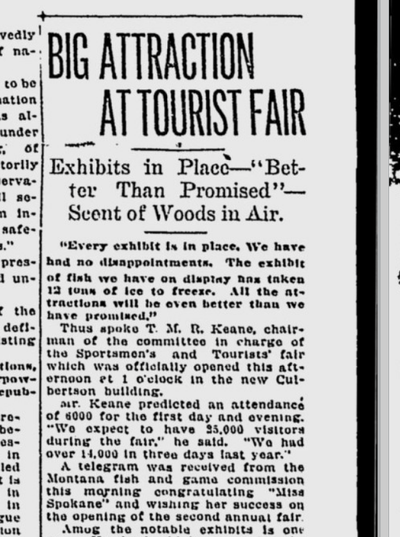100 years ago in Spokane: Outdoor fair with ‘scent of the wilds’ seeks to bring sportsmen to region

Spokane opened its second annual Sportsmen’s and Tourists’ Fair in an ambitious attempt to lure thousands of tourists to the region.
The attractions included several elaborate exhibits, including Newman Lake’s display, titled, “An Old Timer’s Camp at Honeymoon Bay.”
The “soil, plants and mass of the woods” were used to re-create a campsite, complete with an A-frame tent and a “log fire with frying pan in which a bannock (skillet cake) is cooking.”
The display even “has the scent of the wilds.”
A fish display required “12 tons of ice to freeze.” Another exhibit contained mounted heads of elk, deer and mountain goats.
The chairman of the event expected 25,000 visitors before it was over.
From the religion beat: Bishop Walter A. Sellew of the Free Methodist Church warned “the standards of morals among young people has degenerated” compared to 30 years earlier.
The cause? “The introduction of promiscuous dancing in many of our public schools.”
He said business morals have also degenerated, and that businesspeople no longer adhere to their contracts.
He called it the “principle of cancel-itis,” although he did not mean it in the way people use “cancel culture” today. He meant that people no longer felt the need to honor their obligations – both in business contracts and in their “pledges to the church.”
He called for a campaign of “old-fashioned revivals by all churches.”
Bishop Sellew, from the Free Methodist Church in Jamestown, New York, was in Spokane to preside over a church conference.